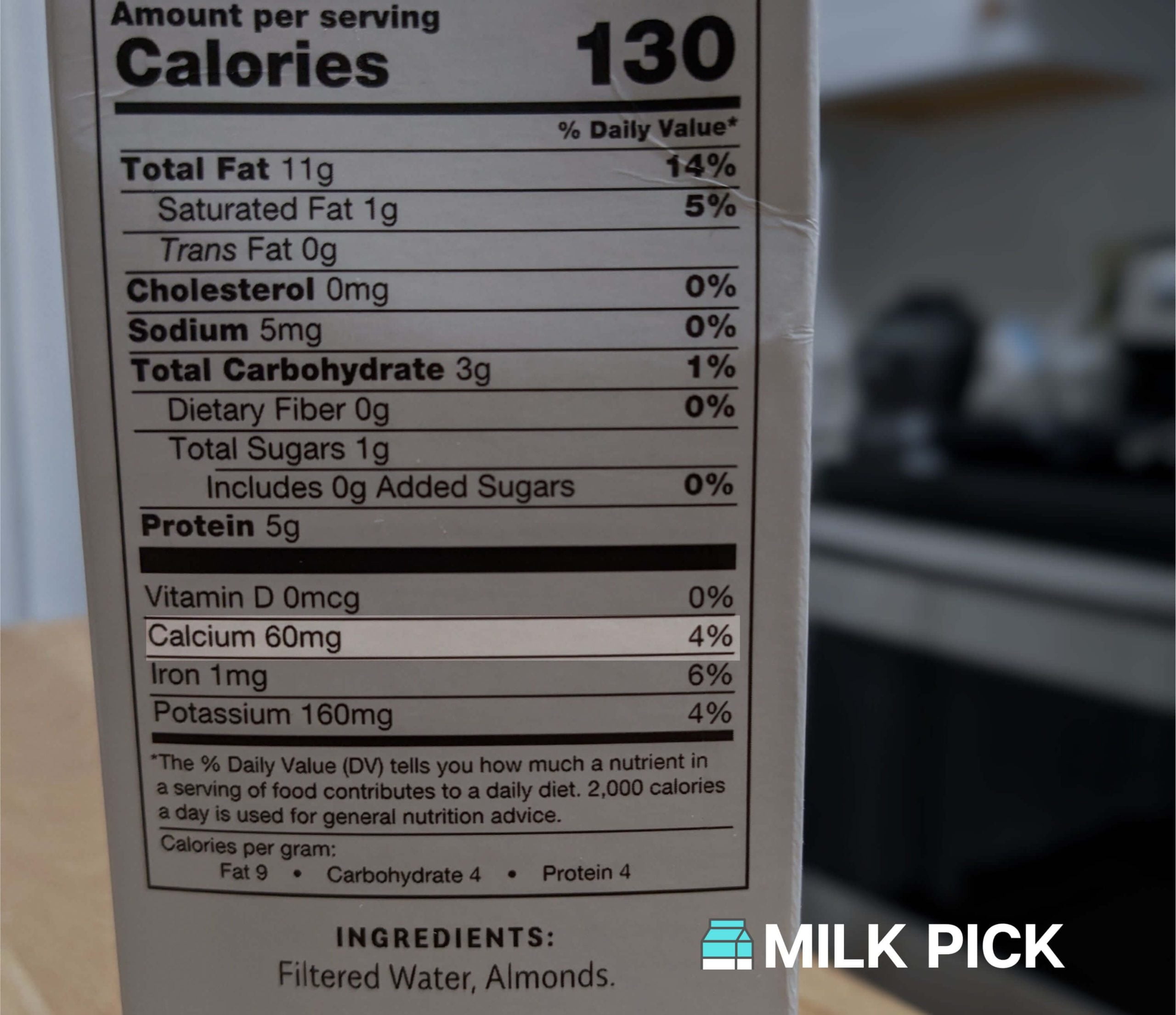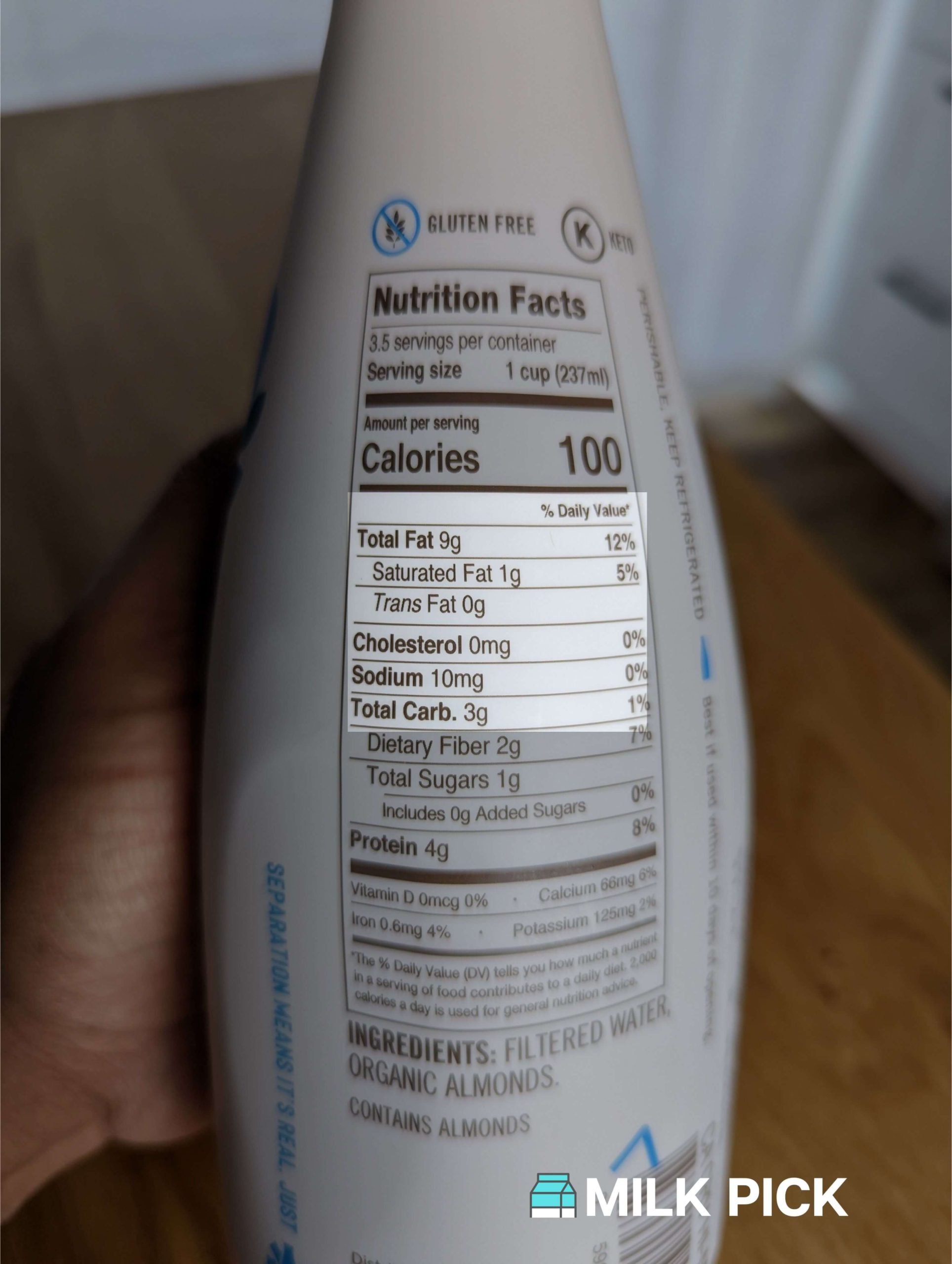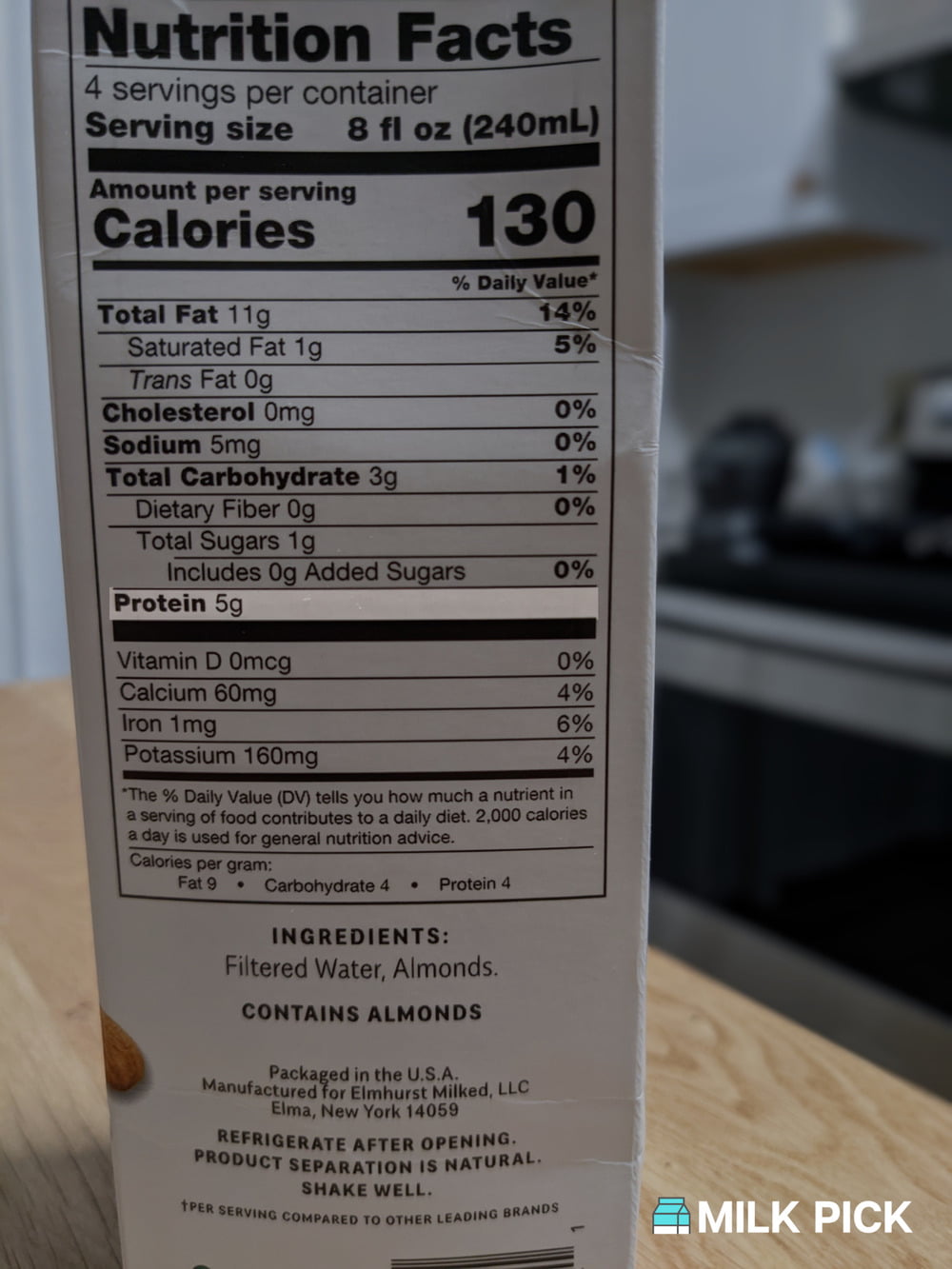Dentists often recommend dairy as the most nutritious option for strong and healthy teeth.
However, not everyone can enjoy a glass of cow milk leisurely due to lactose intolerance, lifestyle choices, or personal preferences.
Read on to learn why unsweetened almond milk is good for teeth and how its nutritional profile benefits your dental health.
We’ll also look into sweetened almond milk and why it’s not good for your teeth.
Quick Answer
Is almond milk good for your teeth?
Unsweetened almond milk is good for teeth because of its nutritional profile. It’s rich in fat, minerals, and vitamins essential for healthy teeth. Research also shows that it has limited tooth-decaying potential.
Why Unsweetened Almond Milk Is Good For Teeth
A study was conducted to analyze the tooth-decaying properties of almond milk beverages.
Researchers tested whole bovine milk, six types of almond milk, and soy milk to see if they supported Streptococcus Mutans formation - the main bacteria that cause tooth decay and cavities.
In the test, unsweetened almond milk showed limited tooth-decaying potential, while soy and sweetened almond milk supported the most bacteria growth.
How Almond Milk Benefits Your Dental Health
Almond milk contains nutrients critical to keeping your teeth healthy and strong.
Let’s look at how its nutritional components benefit your oral health.
Minerals
Calcium
Although almond milk isn’t a significant source of calcium, it does have more calcium than many other types of plant milk.

If you want even more calcium, you can opt for calcium-fortified almond milk.
Check out this article to find out which brands we recommend for the most calcium (without a ton of added ingredients).
Calcium is essential for bone formation. It supports your dental health by strengthening your jawbone and making it sturdy enough to contain the roots of your teeth in their sockets.
Our bodies also use calcium to produce crystalline calcium phosphate - a compound that makes up the hard tooth enamel that surrounds and protects the inner parts of the tooth.
Your diet needs sufficient calcium since bones and enamel wear out with time. Otherwise, your teeth can become loose because the sockets in your jawbone widen.
Your teeth might also become prone to cavities and other types of damage since the enamel might break down faster than it can rebuild itself.
Including calcium-fortified almond milk in your diet can help with your daily calcium intake, restrengthen your enamel, and prevent tooth loss in the future.
Phosphorus
Phosphorus helps in calcium absorption and supports its role in bone development.
It combines with calcium to form crystalline calcium phosphate. As such, it makes your teeth stronger by protecting and rebuilding tooth enamel.
Hydroxyapatite, a naturally occurring form of calcium phosphate, is also a main structural component of bones.
Lack of phosphorus will make your teeth chip easily and lead to brittle bones.
Magnesium
Like phosphorus, magnesium helps the body absorb calcium.
Combined with calcium, it plays a crucial role in building hard tooth enamel and maintaining bone density.
Magnesium is the mineral responsible for forming hard enamel that can resist decay and periodontal disease.
Recent studies show that insufficient magnesium levels lead to the formation of soft enamel, hence the lack of decay prevention.
Hard enamel won’t form without magnesium, even if you increase your calcium and phosphorus intake.
Fortunately, almond milk can help you get more magnesium from your diet compared to dairy and most plant-based milk.
Potassium
Potassium helps bones and teeth use calcium more efficiently.
It also works with magnesium to regulate blood acidity. Too much acid in your blood could lead to the removal of calcium in your teeth and jawbone. That’s why low potassium levels can weaken your teeth and jawbone.
Other forms of potassium can also help your teeth. Toothpaste contains potassium nitrate to help reduce pain signals in people with tooth sensitivity.
Vitamins
Vitamin E
Vitamin E supports your dental health in the following ways:
It protects against diseases caused by chronic inflammation.
Inflammed gums can lead to the formation of ulcers and receding gums. While the inflammation of the jawbone can loosen teeth and lead to teeth loss.
Research also shows that chronic inflammation can cause periodontal disease.
Vitamin E can help control or prevent periodontal disease and inflammation because of its anti-inflammatory properties.
It is an antioxidant that can prevent the activity of harmful free radicals and damage to your tissues.
Adequate vitamin E levels in your mouth can help protect your gums from bacteria that cause gingivitis. According to the Journal of Dental and Medical Sciences, dietary antioxidants can also help prevent periodontitis.
In 2007, a study was conducted on antioxidant activity and periodontal disease. The findings showed that epilepsy patients with periodontal disease had extremely low levels of vitamin E and other antioxidants in their saliva.
Additional research shows that vitamin E can help prevent oral cancer at its early stages because of its antioxidant properties. It can also reduce the side effects of radiation and chemotherapy and improve the effects of chemotherapy treatments.
Almond milk is an excellent source of vitamin E. So you might enjoy the vitamin’s antioxidant and anti-inflammatory benefits if you include it in your diet.
Vitamin D
Vitamin D supports the absorption of phosphorus and calcium. As a result, it helps strengthen the bones around your teeth.
Its anti-inflammatory and antimicrobial properties also play essential roles in oral health.
A 2020 study on Vitamin D and Oral Health found that vitamin D deficiencies can lead to issues like periodontitis, a high risk of tooth defects, cavities, and oral treatment failure, among other things.
While natural almond milk (meaning no added nutrients or ingredients) doesn’t contain vitamin D, some fortified options can boost your intake.
Related: Is Almond Milk Good For Your Bones?
Vitamin A
Fortified almond milk has a significant amount of vitamin A.
Tooth enamel contains a protein (keratin), which uses vitamin A in its formation process. Therefore, it’s safe to say that vitamin A contributes to the strengthening of tooth enamel.
Vitamin A is also essential for your saliva and mucous membranes. Saliva helps clean bacteria and acid between your teeth and prevents dry mouth.
The mucous membranes in your mouth coat your cheeks and gums, making them less vulnerable to diseases and infections.
Vitamin A also has antioxidant properties that improve your periodontal ligament, gum, and bone health. Additionally, it helps manage gum diseases and reduce inflammation in the mouth.
Vitamin B2 (Riboflavin)
Riboflavin helps prevent oral inflammation. It also reduces the risk of gum disease and acute gum infections that can lead to painful sores.
At worst, low levels of vitamin B2 can also lead to ulcerative gingivitis.
Fat
Almond milk is a great source of heart-healthy fat.

Aside from supporting one’s heart health, its high-fat content also supports oral health.
Fats help the body absorb vitamins A, D, E, and K since they’re fat-soluble vitamins. These vitamins are all necessary for strong and healthy teeth.
Almond milk has a small amount of omega-3 fatty acids. But it could help meet your daily omega-3 intake when combined with foods rich in omega-3 fatty acids.
Like vitamin E, omega-3 fatty acids have anti-inflammatory properties that could help manage inflammation caused by periodontitis.
Research shows that omega-3 fatty acids can slow down or even stop the growth of periodontitis or gum disease-causing bacteria.
A study in the Journal of the American Dietetic Association confirmed the tooth-conserving properties of omega-3 fatty acids.
Researchers analyzed data on over 9000 adults and found that those with the most omega 3 (DHA) in their diet were 20% less likely to have periodontitis.
The findings showed that even small amounts of omega-3 fatty acids offered protection against periodontal disease.
Natural brands with higher amounts of almonds tend to have more fats than lower quality almond milk, mostly made with water.
Protein
Depending on the brand, almond milk can be a good or bad source of protein. But even moderate amounts of dietary protein can still contribute to your daily protein intake.
Protein helps build bones and repair tissue. It also strengthens your teeth and jaws and helps them function properly.
As a general rule of thumb, the more almonds used in almond milk, the more protein it will contain.
So if you’re shopping and see almond milk with just one (or even zero) grams of protein, chances are it’s primarily made of water and has very few almonds.
Elmhurst, Malk, and Three Trees are all brands with a decent amount of protein per serving, especially when compared to many other popular brands.

Sweetened Almond Milk And Dental Health
Sweetened almond milk contains added sugars which can cause tooth decay.
In a recent report concerning oral health, the World Health Organization mentioned added sugars as one of the causes of tooth decay. They pointed out that the sugars are converted into acids that destroy teeth over time, resulting in cavities and decay.
You can check the sugar content on the label to ensure you pick the option with the least sugar.
However, we recommend unsweetened almond milk if you’re concerned about your dental health and overall sugar intake.
If you want sweetened almond milk, we recommend making your own. Check out our Instagram video below to see how!
The Final Verdict: Is Almond Milk Good For Your Dental Hygiene?
Unsweetened almond milk can benefit your oral health in several ways.
It naturally contains fat, minerals, and vitamins for strong and healthy teeth. And its fortified version comes with added calcium and vitamin A and D, which are also crucial components of your dental health.
Sweetened almond milk might be tastier, but its sugar content might lead to tooth decay. If you find it hard to avoid added sugars, you can minimize your sugar intake.
Always check the label first to compare the sugar content of each type of milk and settle for the one with the least sugar.
You can also limit the amount of sweetened almond milk you drink and the frequency of your consumption to minimize its effects on your dental health.
